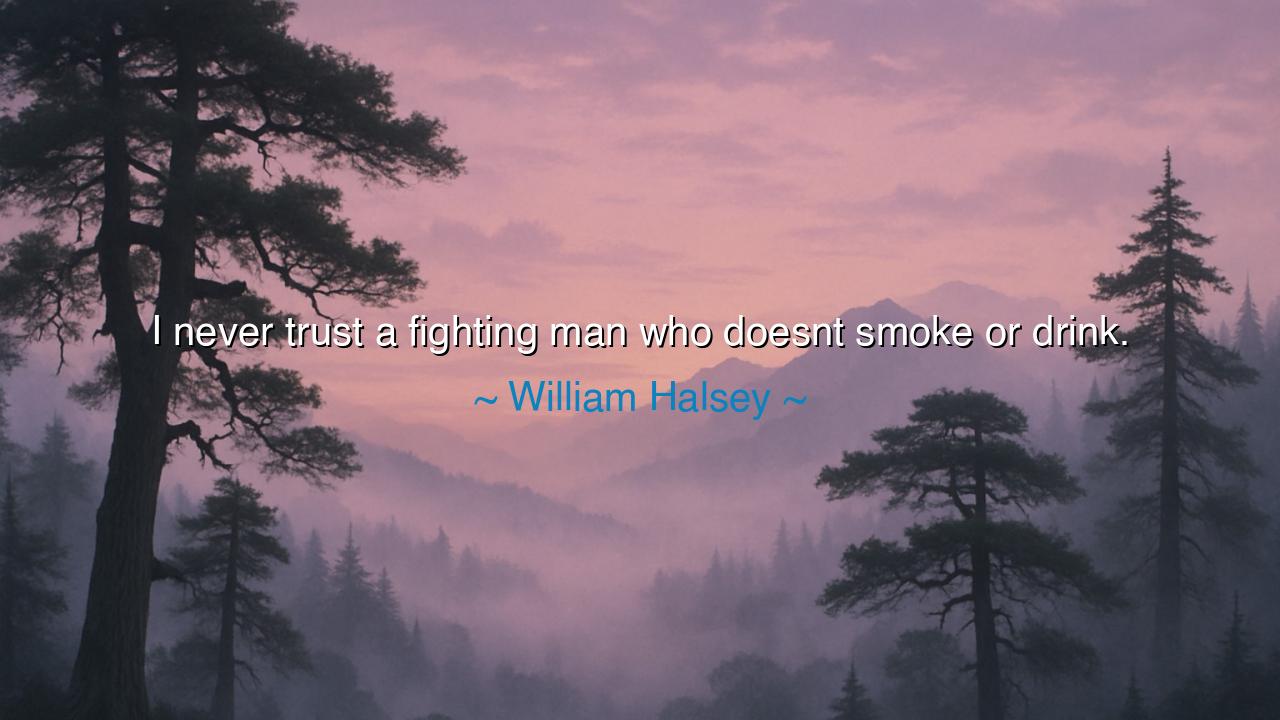
I never trust a fighting man who doesnt smoke or drink.






Hear the words of William Halsey, the fierce admiral of the seas in the Second World War, who declared with bluntness and fire: “I never trust a fighting man who doesn’t smoke or drink.” To the untrained ear, these words may sound like mere jest, or the gruff humor of a sailor hardened by war. Yet beneath their roughness lies a deeper current of wisdom, born from the decks of ships, from the clash of battle, and from the camaraderie of men who faced death together upon the open sea.
What did Halsey mean by these words? He did not literally command every warrior to drink wine or light a cigar. Rather, he sought to reveal something about the soul of the fighting man—that those who face war without some touch of vice, some release of tension, may be untested, brittle, or unable to endure the crushing weight of battle. Smoking and drinking in his era were symbols not merely of habit, but of humanity, of fellowship, of the shared rituals that bound soldiers together in the face of fear. To partake was to be part of the brotherhood, to prove oneself not as a machine of war, but as a man among men.
Consider the camps of soldiers throughout history. In the trenches of World War I, where mud and death swallowed countless souls, men clung to cigarettes passed from hand to hand. A single match became a beacon of comfort in the darkness, a reminder that even amidst the roar of artillery, life still flickered. In the evenings, a ration of rum or brandy was not only warmth against the cold but also courage against despair. These small indulgences stitched bonds among comrades, softening the hardness of war. Halsey knew well that such men, who bore their burdens with humanity, could be trusted more than those who seemed aloof, untouched, or overly rigid.
Yet his words also carried warning. The man who claims to have no need for relief, who carries himself in cold perfection, may not be entirely real. War tests the body, but it breaks the spirit, and those who deny their own frailty may crumble when the hour is darkest. Halsey’s mistrust was not of the abstinent, but of the man who hides his weakness behind a mask of purity, who will not share in the small rituals of his brothers. For trust in war is built not only on strength, but on vulnerability shared, on the humanity revealed in quiet moments between battles.
We may also see this in the tale of Alexander the Great, who, though a conqueror of empires, sat and drank with his men, sharing wine as he shared hardship. His greatness was not in aloofness but in nearness; his men would march into the fire for him, because they knew he was one of them. Contrast this with leaders who remained distant, denying the common bonds of their soldiers, and you will find men who inspired fear but not loyalty. Trust, Halsey reminds us, is forged in fellowship.
O children of the future, learn this truth: to fight, to strive, to struggle—whether in war or in life—you must be human first. Do not trust the one who pretends perfection, who denies weakness, who stands apart from the bonds of fellowship. Trust instead the one who laughs, who weeps, who shares in the simple rituals of life, who reveals himself as mortal. For such a one will stand by you when the storm rages, not out of duty alone, but out of brotherhood.
The lesson for you is clear: whatever your battlefield—be it war, work, or the struggles of the soul—seek to build trust through humanity. Share in the burdens of others. Do not hide behind a mask of purity or strength, but show your scars, your flaws, your laughter, and your tears. It is not perfection that wins trust, but authenticity. Halsey’s words, rough though they may sound, speak to this ancient truth: the strongest warriors are not those who deny their humanity, but those who embrace it fully, even in the shadow of death.
So let his saying echo as both humor and wisdom: “I never trust a fighting man who doesn’t smoke or drink.” Understand it not as command to vice, but as call to humanity. Be real, be present, be bound to others not only by duty but by shared life. For in the end, battles are not won by steel alone, but by trust—and trust is born where men meet one another as humans, not as gods.






AAdministratorAdministrator
Welcome, honored guests. Please leave a comment, we will respond soon